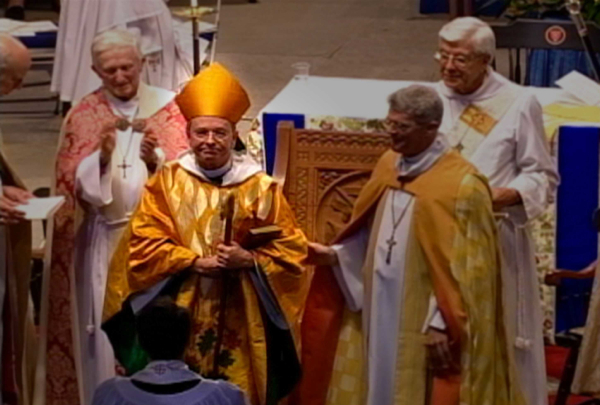Movie review by Greg Carlson
An unabashedly strong-willed documentary with powerful convictions, “For the Bible Tells Me So” is far more likely to reinforce the beliefs of the audience members who will seek it out than it is to alter the viewpoint of the anti-gay people of faith to whom it is directed. Compact, sprightly, and well edited, “For the Bible Tells Me So” uses essentially the same technique as Ken Burns and Lynn Novick’s popular PBS documentary “The War”: intimate, personal portraits of a handful of families mixed with remarkably arresting archival imagery. Instead of World War II, however, the battle at hand in “For the Bible Tells Me So” pits religious conservatives against homosexuals.
Director Daniel Karslake, a veteran of the PBS newsmagazine “In the Life,” begins the movie with 1977 footage of Anita Bryant taking a pie to the face, setting an immediate agenda that symbolically reconstructs banana-cream assaults on a range of targets, many of them slow-moving and all too easy. From Jimmy Swaggart’s peculiar, rapid-fire enunciation of “abomination” to Focus on the Family and James Dobson’s incredible capitalist machinery, homophobia is shown to have been very good to the far right, financially speaking.
The families profiled in the film include the Reitans of Minnesota, who supported son Jake unconditionally when he came out to them, and the Gephardts of Missouri, who treated daughter Chrissy the same way. Chrissy’s dad, the perennial candidate for the presidency of the United States, is joined by several other well-known figures, including Desmond Tutu, who speaks as eloquently and compassionately as one would expect. Gene Robinson, the first openly gay clergyman to become a bishop in the Episcopal Church, and his parents share their stories. Brenda and David Poteat have a more difficult time dealing with the lesbianism of their daughter Tonia. The most devastating story belongs to Mary Lou Wallner, who lost her daughter Anna to suicide.
One of the most intriguing dimensions of the movie, and likely to be the most controversial, revolves around biblical interpretation of the chapters and verses purportedly indicating the immorality of homosexuality. Karslake’s choice of speakers on the matter, including two Harvard theologians, does not include enough dissenting opinion to give the impression of a true debate, but the message of love and tolerance remains both thoughtful and moving. Less effective is a humorous animation designed to resemble a vintage educational film. Despite its ability to draw laughs, it often takes the same preachy, scolding, superior tone of the haters it skewers.
Karslake’s condemnation of organized religion on the matter of homosexuality raises the question of whether mainstream denominations will be able to change. The consecration ceremony of Robinson, during which he famously wore a bullet-proof vest after receiving multiple death threats, provides one example that negative attitudes can give way to acceptance. Given its hateful rhetorical power in modern language usage, it is certainly not an easy task to convince skeptics that the concept of abomination simply means “against custom” as opposed to the connotation that it refers to the vile, shameful, and detestable. “For the Bible Tells Me So” alludes to other abominations cited in the Bible, including the eating of shrimp, which reinforces the idea that interpretability is a necessary condition in the process of understanding Christian Scripture.
